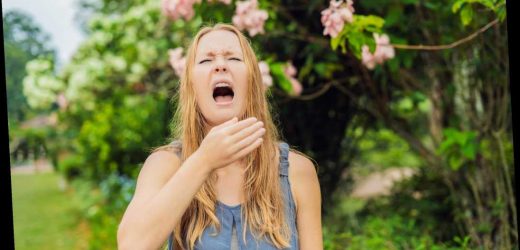HAY FEVER brings misery to one in five Brits every year.
But now experts are warning that the pollen season could start as early as this month – and last three weeks longer.
Most people with the irritating condition are allergic to grass pollen, which is usually worst between May and July.
For others, it's tree pollen which starts to come into season around February and typically ends around June, according to Allergy UK.
It means that those with the seasonal allergy could begin to see hay fever symptoms triggered in the coming weeks – if not already.
Meanwhile, scientists have warned that climate change is making is making hay fever misery worse.
New research has found it's made the season around three weeks longer than 30 years ago.
What is more, there is over a fifth more pollen in the air – and the amount is going up.
CLIMATE CHANGE
Global warming is causing extra weeks of itching, sneezing and runny noses.
The phenomenon has been blamed on burning of fossil fuels, cutting down rainforests and farming livestock.
It is another reason to cut emissions of greenhouse gases, say biologists.
Lead author Dr William Anderegg, of the University of Utah in the US, warned: "The strong link between warmer weather and pollen seasons provides a crystal clear example of how climate change is already affecting peoples' health."
The study found pollen seasons today start around 20 days earlier than in 1990.
Warming is causing the plants' internal timing, known as its 'phenology', to start producing pollen earlier in the year.
A similar trend has been identified in the UK. The traditional period used to span just over a month – from mid June to mid July.
It can now last from March until September. Hay fever affects up to one in five Britons.
Allergies to airborne pollen can be more than just a seasonal nuisance, explained the US team.
They are linked to respiratory health with implications for viral infections, emergency room visits and even children's school performance.
LINGERING
More pollen hanging around for a longer season makes those affects worse.
Greenhouse experiments have shown increases in temperature and atmospheric CO2 – hallmarks of human-caused climate change – can cause more pollen production.
Tests have also suggested worsening of pollen seasons in some plant locations are due to rising temperatures.
The study published in Proceedings of the National Academy of Sciences is the first to confirm it across a continent.
Dr Anderegg said: "A number of smaller-scale studies – usually in greenhouse settings on small plants – had indicated strong links between temperature and pollen.
"This study reveals that connection at continental scales and explicitly links pollen trends to human-caused climate change."
The analysis is based on National Allergy Bureau measurements of airborne pollen and mould across the US and Canada between 1990 and 2018.
They were collected between 1990 and 2018 and hand counted by staff at 60 stations across the US and Canada.
Nationwide pollen quantities soared by around 21 percent over the period.
5 ways to treat hay fever
There's currently no cure for hay fever, but most people are able to relieve symptoms with treatment – to a certain extent.
1. Have more sex
Apparently, having sex can help to relieve symptoms of congestion.
Researchers at Tabriz Medical University in Iran suggested that getting frisky during pollen season could ease allergy-related symptoms such as sneezing.
According to their study, sex causes blood vessels in nasal passages to constrict helping to clear blocked noses and dry up runny eyes.
Max Wiseberg, airborne allergen expert and founder of HayMax barrier balms, said: “There is research which suggests that sex could help with the symptoms, so that may be something to consider although there may be some practical issues around timing and locations.
“However there is probably not a more pleasant way to deal with the symptoms of hay fever.”
The only downside is that the effects are thought to only affect guys who ejaculate – not women.
2. Avoid pollen
The most effective way to control hay fever is to avoid exposure to pollen.
Allergy UK says the best way to do this is to keep windows and doors closed when inside – especially early in the morning and evening when the pollen count is highest.
They also advise avoiding peak pollen times and wearing wraparound sunglasses and a hat to prevent pollen getting onto the face and in the eyes.
You should also avoid drying clothes on an outdoor washing line and shower when you get indoors to remove pollen from your skin and hair.
3. Antihistamines
Antihistamines treat hay fever by blocking the action of the chemical histamine, which the body releases when it thinks it's under attack from an allergen. This stops the symptoms of the allergic reaction.
Antihistamines are usually effective at treating itching, sneezing and watery eyes, but they may not help with clearing a blocked nose.
They're available in tablet form and also as nasal sprays and eye drops.
4. Corticosteroids
Corticosteroids (steroids) are used to treat hay fever because they have an anti-inflammatory effect.
When pollen triggers your allergic reaction, the inside of your nose becomes inflamed.
Corticosteroids can reduce the inflammation and prevent the symptoms of hay fever.
5. Natural remedies
Many people are turning towards natural remedies rather than conventional medicine to alleviate symptoms.
Some try inhaling steam to clear congestion while others suggest drinking nettle tea – an anti-inflammatory.
Lloyds Pharmacy pharmacist Pareena Patel says: “Allergic reactions can cause symptoms in your nose, especially pollen allergies during hay fever season, which can cause nasal congestion.
"Allergies may also trigger symptoms of asthma, and can make breathing more difficult.
"If you are struggling with your breathing you should speak to your local pharmacist or GP for advice.
“Drug free therapy is a way of helping to treat symptoms without taking medication.
"It involves using natural techniques or products to alleviate your symptoms.
"This approach used on its own or combined with medication can be a more sustainable way of helping to manage your condition."
The greatest increases were recorded in Texas and the Midwestern US – with trees the leading plant culprit.
Statistical calculations and nearly two dozen climate models showed global warming accounts for about half the lengthening of the season.
It is also responsible for roughly eight percent of the increasing pollen and the contribution of climate change to it is accelerating, said the researchers.
This was demonstrated by splitting the years into two – 1990 to 2003 and 2003 to 2018.
Dr Anderegg added: "Climate change is not something far away and in the future.
"It is already here in every spring breath we take and increasing human misery.
"The biggest question is – are we up to the challenge of tackling it?"
Hay fever is one of the most common allergies in the UK, affecting around 13 million people.
It is not life threatening but can be debilitating, making even simple chores difficult.
Source: Read Full Article




